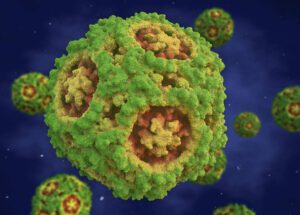How Long Can Parvo Last in the Environment?
Parvo is a devastating canine disease caused by a tough virus that can survive in the environment for a surprisingly long time.
Reports vary, but basically the parvo virus can live on any surface for weeks to months. Parvo can live on concrete for up to nine months. It will live on untreated carpets for six months. Parvo can live on human skin, too, but it’s the rare individual who would not immediately clean up dog feces on their skin. (Parvo is a highly contagious disease spread by contact with feces from infected canines.)
Cleaning up outdoors is a major challenge. While sunlight helps destroy parvovirus, some reports say parvo can live up to nine years in untreated ground, depending on temperatures and humidity. Many reports say seven to nine months is more realistic, but still, it’s a long time.
How to Get Rid of Parvo
Because it’s so highly contagious, parvo is difficult to control. Obviously, keep infected dogs clean and free of feces debris. If you want to get rid of parvo, pick up any fecal material as best you can. It helps to put some bleach on the spots you clean, if possible. For small outdoor areas, you may want to spray of mix of 10:1 water:bleach.
If dealing with a parvo outbreak, assume all fecal material is contaminated. All organic debris needs to be removed or it will harbor the virus. Use a strong detergent followed by a disinfectant.
Follow the deep cleaning with bleach – bleach is one of the few effective disinfectants – where you can. This includes hard surfaces, including floors, bowls, and crates (both in the home and the car). Any disinfectant should be in contact with the area to be cleaned for a minimum of 10 minutes. After that, you can clean the area to be sure no cleaner residue is left behind, especially on bowls and crates.
Most families prefer not to bleach their carpets. Some commercial cleaners such as TekTrol are approved to kill parvo virus and claim to not damage your carpets.
Stop the Parvo Spread

It is easy for people to unwittingly spread parvo virus. It is not an airborne virus, but it can survive on your skin, your clothes, dog bowls, dog beds – basically anywhere. Excellent hygiene is important to rid your home or kennel of this virus:
- Wash your hands after handling an infected pup or dog.
- Use a bleach hand wipe to help physically remove the virus.
- Wear gloves that you can then bleach.
- Change and wash your clothes and shoes (or use disposable shoe covers) after being around an infected dog or puppy. You may want to have a “parvo outfit” that you then bleach and discard when your dog is better.
Phew! It’s easy to see why doing preventive parvovirus vaccinations is the best way to deal with parvo.




